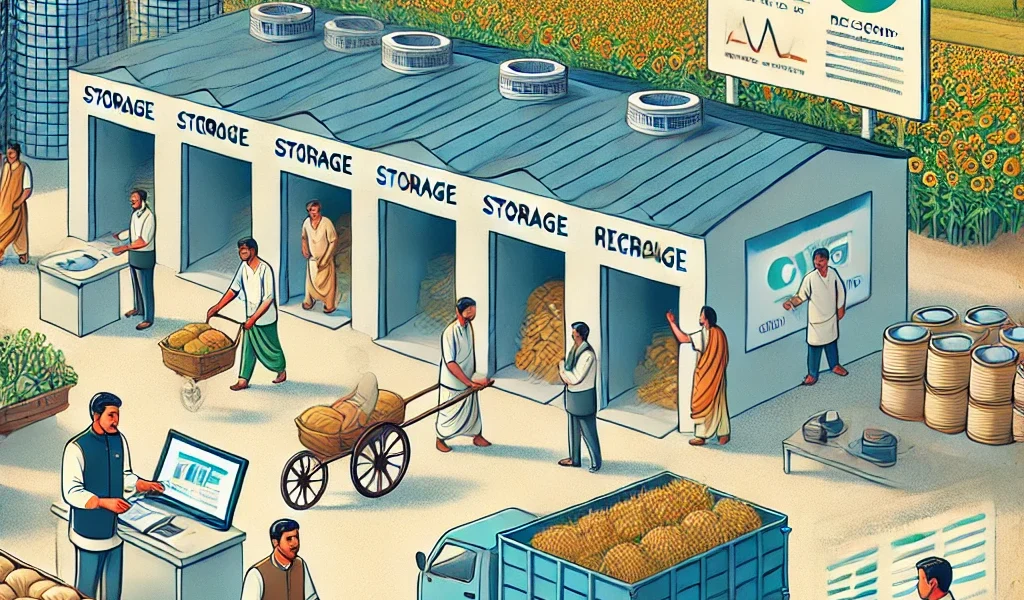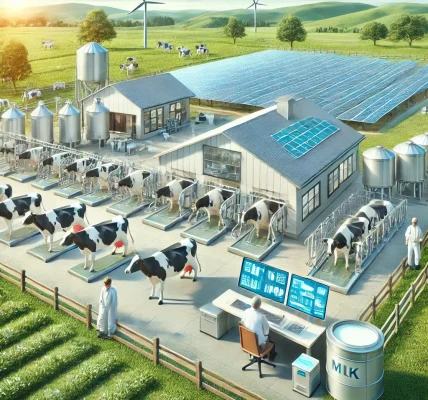Introduction
Small farmers in India face several challenges, including post-harvest losses, inadequate storage, and low market prices. To tackle these issues, the Indian government has introduced warehouse infrastructure schemes that help farmers store their produce safely, reduce wastage, and sell at better prices.
This article explores how small farmers can benefit from government-backed warehouse facilities, the various schemes available, and the steps to access them.
Why Do Small Farmers Need Warehouse Facilities?
Many small farmers are forced to sell their crops immediately after harvest due to a lack of storage facilities, often at lower prices due to seasonal oversupply. By using government-backed warehouse facilities, they can:
- Store crops safely and avoid wastage.
- Wait for better market prices before selling.
- Access warehouse receipt loans to meet financial needs without selling their produce at low prices.
- Improve quality control and grading, making their products more valuable.
Key Government Schemes Supporting Warehouse Facilities for Farmers
1. Gramin Bhandaran Yojana (Rural Godown Scheme)
The Gramin Bhandaran Yojana aims to improve rural storage infrastructure by providing financial assistance to farmers, cooperatives, and entrepreneurs for building warehouses.
Benefits for Small Farmers:
- Storage at subsidized rates in rural godowns.
- Reduction in post-harvest losses, ensuring better income.
- Financial support for building small warehouses (if they own land).
How to Avail This Scheme?
- Farmers can apply through NABARD or State Agricultural Departments.
- Subsidy of 25% to 33% is available depending on category (SC/ST farmers receive higher subsidies).
2. Warehouse Infrastructure Fund (WIF) by NABARD
The Warehouse Infrastructure Fund (WIF) was launched to improve scientific storage capacity across India.
Benefits for Small Farmers:
- Access to well-equipped warehouses to maintain grain quality.
- Cold storage facilities for perishable items.
- Reduced dependency on middlemen, leading to better profits.
How to Avail This Scheme?
- Farmers or FPOs (Farmer Producer Organizations) can register with NABARD for warehouse support.
- Loans with lower interest rates are provided for warehouse construction.
3. Warehouse Receipt Financing Scheme
The Warehouse Receipt Financing Scheme allows farmers to get short-term loans against the stored produce, helping them meet immediate financial needs without selling at low prices.
Benefits for Small Farmers:
- Loans of up to 70%-80% of crop value.
- Low-interest rates compared to regular loans.
- Storage period flexibility to sell crops at better prices.
How to Avail This Scheme?
- Farmers need to store their produce in a government-registered warehouse.
- Warehouse issues an electronic Negotiable Warehouse Receipt (eNWR), which can be used to avail loans from banks like SBI, NABARD, and private lenders.
4. Food Corporation of India (FCI) and Central Warehousing Corporation (CWC) Facilities
The FCI and CWC provide large-scale storage solutions for farmers, helping them store crops under scientific storage conditions.
Benefits for Small Farmers:
- Safe and pest-free storage of grains.
- Lower storage costs under government schemes.
- Option to sell directly through government procurement programs.
How to Avail This Scheme?
- Farmers can contact local FCI or CWC offices to register for warehouse storage.
- Subsidized storage rates are provided for small farmers.
How Small Farmers Can Use Government Warehouses Effectively
1. Storing Crops at the Right Time
- Farmers should store their produce immediately after harvesting to maintain quality.
- Using properly equipped warehouses prevents damage from pests, moisture, and theft.
2. Using Warehouse Receipt Loans
- Instead of selling crops at low prices, farmers can take loans against warehouse receipts.
- This helps them cover farming expenses and avoid distress selling.
3. Selling at the Right Time
- Farmers can monitor market prices and demand trends before selling.
- Stored grains can be sold at higher prices when demand rises.
4. Joining Farmer Producer Organizations (FPOs)
- FPOs allow small farmers to collectively store and market their produce, increasing bargaining power.
- They can avail government subsidies as a group to build shared warehouses.
Challenges Faced by Small Farmers in Using Warehouses
Despite the benefits, small farmers face certain challenges:
- Lack of awareness about warehouse facilities and loan schemes.
- Limited access to government warehouses in remote areas.
- Paperwork and documentation challenges for availing subsidies and loans.
- Storage costs (even if subsidized) may be unaffordable for very small farmers.
Solutions to Overcome Challenges
- Government and NGOs should increase awareness programs for farmers about warehouse schemes.
- Digital platforms should be used to simplify warehouse registration and loan applications.
- More community storage facilities should be built in rural areas.
Conclusion
Government-backed warehouse facilities are a game-changer for small farmers, helping them reduce losses, improve profits, and access better market prices. By leveraging government schemes like the Gramin Bhandaran Yojana, Warehouse Infrastructure Fund, and Warehouse Receipt Financing, farmers can ensure financial stability and long-term sustainability in their agricultural business.




